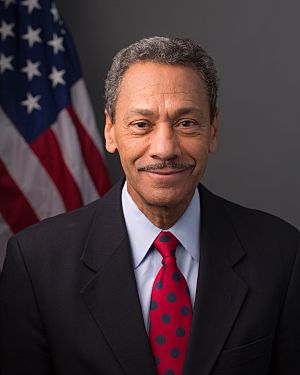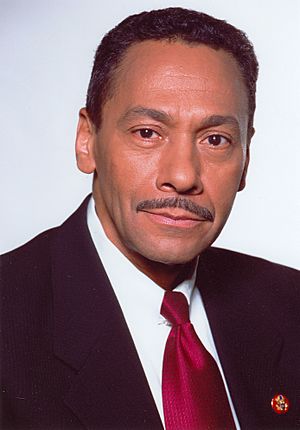Mel Watt facts for kids
Quick facts for kids
Mel Watt
|
|
|---|---|
 |
|
| Director of the Federal Housing Finance Agency | |
| In office January 6, 2014 – January 6, 2019 |
|
| President | Barack Obama Donald Trump |
| Preceded by | Edward DeMarco (acting) |
| Succeeded by | Joseph Otting (acting) |
| Member of the U.S. House of Representatives from North Carolina's 12th district |
|
| In office January 3, 1993 – January 6, 2014 |
|
| Preceded by | District reestablished |
| Succeeded by | Alma Adams |
| Member of the North Carolina Senate from the 33rd district |
|
| In office January 1985 – January 1987 |
|
| Preceded by | Constituency established |
| Succeeded by | Jim Richardson |
| Personal details | |
| Born |
Melvin Luther Watt
August 26, 1945 Steele Creek, North Carolina, U.S. |
| Political party | Democratic |
| Spouse | Eulada Watt |
| Children | 2 |
| Education | University of North Carolina, Chapel Hill (BS) Yale University (JD) |
Melvin Luther Watt (born August 26, 1945) is an American politician. He served as the director of the Federal Housing Finance Agency from 2014 to 2019. President Barack Obama chose him for this important role.
Before that, he was a U.S. Representative for North Carolina's 12th district. He served in the House from 1993 to 2014. Mel Watt is a member of the Democratic Party.
He started his career as a lawyer in Charlotte, North Carolina. He also served one term as a state senator. He helped manage political campaigns, including for Charlotte mayor Harvey Gantt.
On May 1, 2013, President Obama nominated Watt to lead the Federal Housing Finance Agency. This agency helps oversee important housing groups like Fannie Mae and Freddie Mac. The U.S. Senate approved his nomination on December 10, 2013. He then left the House of Representatives on January 6, 2014. His term as director ended on January 6, 2019.
Contents
Early Life and Education
Melvin Luther Watt was born in Steele Creek, North Carolina. This area is located in Mecklenburg County, North Carolina. His parents were Evelyn Lucille and Graham Edward Watt.
He went to York Road High School in Charlotte, North Carolina. He then studied at the University of North Carolina at Chapel Hill. He graduated in 1967 with a degree in Business Administration. He was a Phi Beta Kappa graduate, which means he was a top student.
In 1970, he earned a law degree from Yale Law School. He also wrote for the Yale Law Journal, a respected legal publication.
Beginning His Career
Watt worked as a lawyer from 1970 to 1992. He focused on helping minority-owned businesses grow. He was also a partner in several small businesses.
He managed the political campaigns for Harvey Gantt. Gantt ran for mayor of Charlotte and for the U.S. Senate. Watt himself served in the North Carolina Senate. He was a state senator from January 1985 to January 1987.
Serving in the U.S. House of Representatives
In 1992, Mel Watt ran for the newly created 12th District in North Carolina. This district had a large African-American population. He won the Democratic primary election. This was the most important election in this district, as it was strongly Democratic.
He easily won the general election with 70 percent of the votes. He became the first Democrat to represent a large part of Charlotte since 1953. His district's boundaries changed in 1993, but it remained a strong Democratic area. Watt was reelected 10 more times. He only faced one close election during his time in the House.
Important Committees and Groups
While in Congress, Watt served on several important committees. These committees help create and review laws.
- Committee on Financial Services
- This committee deals with banks, housing, and money.
- Committee on the Judiciary
- This committee works on laws related to the justice system. He was a top member (Ranking Member) on a subcommittee about intellectual property.
He was also part of several groups in Congress:
- Congressional Black Caucus: This group includes African-American members of Congress. Watt was chosen to be its Chairman from 2005 to 2006.
- Congressional Progressive Caucus: This group focuses on progressive policies.
- International Conservation Caucus: This group works on protecting nature around the world.
Laws He Supported
Mel Watt helped with several laws during his time in Congress.
- In 2010, he supported the Coin Modernization, Oversight, and Continuity Act of 2010. This law updated rules for making coins.
- In 2011, he supported the Stop Online Piracy Act. This bill aimed to stop online piracy.
- In 2013, he supported the Amash–Conyers Amendment. He was against the Innovation Act.
Leading the Federal Housing Finance Agency
Becoming Director
On May 1, 2013, President Obama announced he wanted Mel Watt to lead the Federal Housing Finance Agency (FHFA). This agency plays a big role in the U.S. housing market. It oversees companies like Fannie Mae and Freddie Mac. These companies help people buy homes.
Some people in Congress had questions about his nomination. They wondered if a politician was the best choice for the job. They also questioned if he had enough experience in housing finance. President Obama officially nominated him on May 7, 2013.
In July 2013, a Senate committee voted to approve his nomination. The full Senate then had to vote. On October 31, 2013, a vote to move his nomination forward failed. However, after more votes on December 10, 2013, the Senate approved his nomination. He became the director of the FHFA.
Political Campaigns and Elections
In 1992, Mel Watt was elected to the U.S. House of Representatives. He represented North Carolina's 12th Congressional District. He was one of only two African American members elected to Congress from North Carolina in the 20th century. The other was Eva M. Clayton.
He won his elections by large margins. For example, in 2010, he received about 64% of the votes. In 2012, he won with nearly 80% of the votes. This shows he had strong support from the people in his district.
See also
- List of African-American United States representatives
- North Carolina Democratic Party
Images for kids



